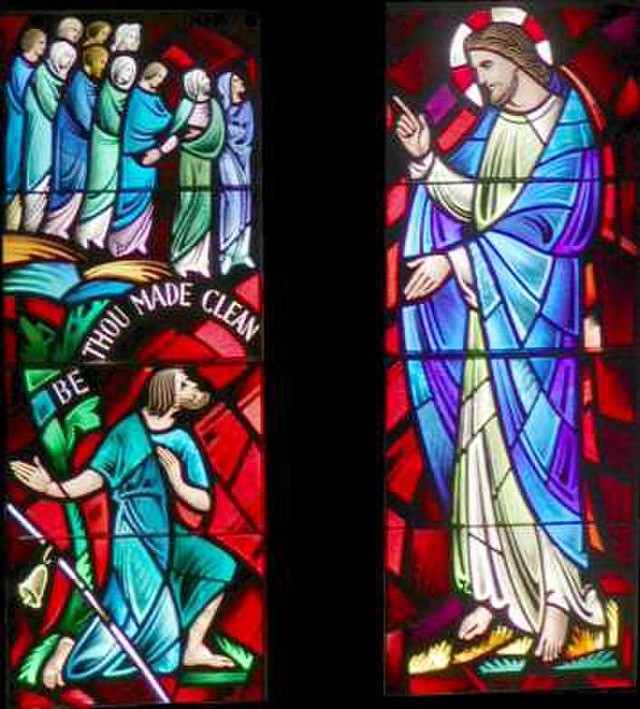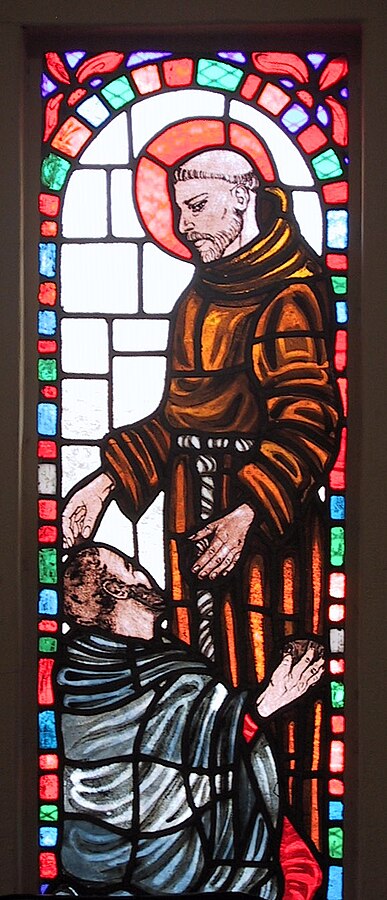Franciscan Friar Fr. Paul Gallagher reflects on the Gospel text for the Sixth Sunday of Ordinary Time. How do feel around people who are physically handicapped or physically disfigured?
The content is edited by Franciscan Sister of Christian Charity Sister Anne Marie Lom and Joe Thiel. The excerpts from the Sunday readings are prepared by Joe Thiel. To read or download the complete pdf with excerpts for your prayer, please click here Franciscan Gospel Reflection February 11 2024 Excerpts are from the Lectionary for Mass for Use in the Dioceses of the United States of America, second typical edition © 2001, 1998, 1997, 1986, 1970 Confraternity of Christian Doctrine, Inc., Washington, DC. Used with permission. All rights reserved. No portion of this text may be reproduced by any means without permission in writing from the copyright owner. Photos: https://commons.wikimedia.org/wiki/File:Cleansing10.jpg; Jim McIntosh from Silver Spring, USA, CC BY 2.0 <https://creativecommons.org/licenses/by/2.0>, via Wikimedia Commons
(First Reading) Leviticus 13:1-2, 44-46
The Lord said to Moses and Aaron, “If someone has on his skin a scab or pustule or blotch which appears to be the sore of leprosy, he shall be brought to Aaron, the priest, or to one of the priests among his descendants.
If the man is leprous and unclean, the priest shall declare him unclean by reason of the sore on his head. “The one who bears the sore of leprosy shall keep his garments rent and his head bare, and shall muffle his beard; he shall cry out, ‘Unclean, unclean! ‘As long as the sore is on him he shall declare himself unclean, since he is in fact unclean. He shall dwell apart, making his abode outside the camp.
Mark 1:40-45
A leper came to Jesus and kneeling down begged him and said, “If you wish, you can make me clean.” Moved with pity, he stretched out his hand, touched him, and said to him, “I do will it. Be made clean.” The leprosy left him immediately, and he was made clean. Then, warning him sternly, he dismissed him at once. He said to him, “See that you tell no one anything, but go, show yourself to the priest and offer for your cleansing what Moses prescribed; that will be proof for them.” The man went away and began to publicize the whole matter. He spread the report abroad so that it was impossible for Jesus to enter a town openly. He remained outside in deserted places, and people kept coming to him from everywhere.
Background:
The first reading from Leviticus is included this week, because it sheds light on the seriousness with which people dealt with the disease that they referred to as leprosy in Jesus’ area. It was such a concern that the entire thirteenth chapter of the book of Leviticus is an instruction of how to respond to a person who may be leprous.
Last week the Gospel concluded with Jesus not following Peter’s suggestion that they return to Capernaum where people were gathering hoping to witness Jesus curing or casting out demons. Instead, Jesus said, “Let us go on to the nearby villages that I may preach there also. For this purpose have I come.” (Mark 1:38) The last line of the text was, “So he went into their synagogues, preaching and driving out demons through the whole of Galilee.” (Mark 1:39) The Gospel text for this Sunday follows. This is still only the second day of Jesus’ public ministry as Mark unfolds his life, but he continues to demonstrate that he is more powerful than those evil spirits that were believed to be the cause of sickness.
The person described in the text has a skin condition that makes him both a social outcast and ritually unclean. By coming forward and presenting himself to Jesus, the leper is disregarding the law that isolates those with his condition. Jesus is described in the text as being moved with pity. The verb in the Greek text would suggest moved with “deep inner groaning.” By touching the man, Jesus himself becomes ritually unclean. Responding to the man is more important than maintaining his own ritual purity. The touch, which renders Jesus unclean, brings healing. Ritual cleanliness needed to be verified by a priest, therefore Jesus sends him to the priest, with the warning not to tell anyone what has taken place. The text does not indicate that the man went to the priest, but instead he began to tell people what had taken place. As a result, large numbers of people were seeking out Jesus. This might suggest that the common person could readily observe that the leper had been healed of his condition. If man did not bother to be officially declared cleansed of his illness, the priest may have been offended. Those details are not included because that is not why Mark is writing his Gospel.
Reflection Questions:
- How do you feel being around people who are mildly and severely contagious?
- How do feel around people who are physically handicapped or physically disfigured?
- Do you know people who hide parts of their body because of a disfigurement?
- Do you have parts of your body that you consider unattractive? Do those feelings at times find expression in how you dress or in activities you avoid?
- Do you think that there was a moment when Jesus really didn’t know if he could cure this leper? What do you think it would have been like for Jesus to hear him say to him, “you can do this if you want?”
- Given the cultural fear of leprosy, do you think Jesus too feared contracting leprosy if he did touch him?
- What do you think it was like for this leper to have Jesus touch him?
- The text says that Jesus was moved with pity when he encountered the leper. Are there times when you find that you too are moved with pity for others? How did that experience affect you and the other person?
- The leper says to Jesus: “If you wish, you can make me clean.” Have you ever spoken in a similar fashion to God?
- Have you ever desired to feel the touch of God in your life? Can you talk with God honestly about that desire?




